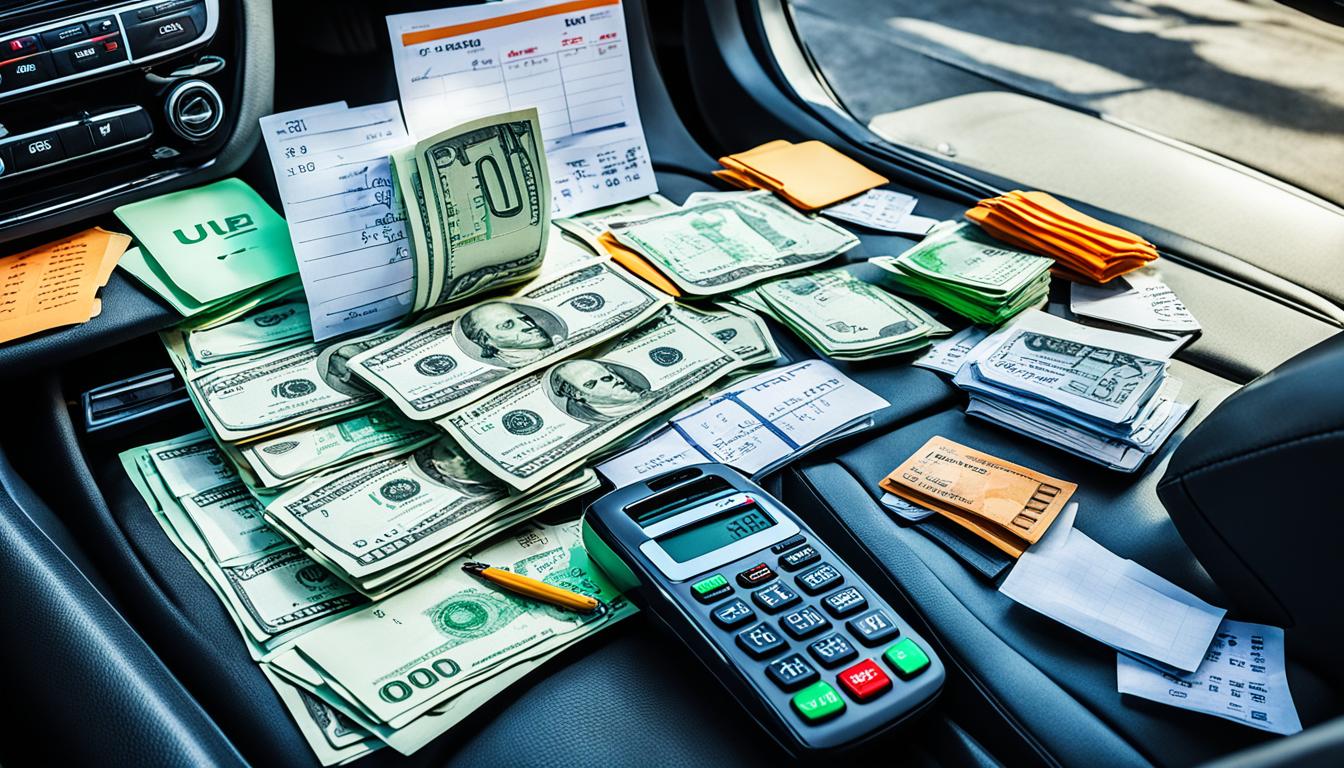Buckle up, tax-savvy riders! You’re about to learn about Uber tax deductions. This guide is for drivers and passengers who want to know about rideshare expenses.
Did you know Uber and Lyft paid out $328 million in a settlement? Uber gave $290 million and Lyft gave $38 million. This affects your taxes.
Drivers outside New York will now earn at least $26 per hour. There’s also an annual increase to keep pay fair. And, drivers get paid sick leave now. It’s like getting a surprise fare increase that helps you!
Key Takeaways
- Uber drivers receive 1099 forms for tax purposes
- The NAICS code for rideshare driving is 485300
- Drivers can deduct various expenses on Schedule C
- Car-related deductions include gas and depreciation
- Other deductible items may include music subscriptions and rider refreshments
The Taxing World of Rideshare Expenses
Buckle up, Uber drivers! You’re about to dive into the wild world of rideshare taxes. As a self-employed road warrior, you’ll face unique challenges when it comes to tracking your income and expenses.
Understanding Your Uber 1099 Forms
Uber sends out two types of 1099 forms: the 1099-K and 1099-NEC. These forms are crucial for reporting your earnings and claiming tax write-offs. Let’s break them down:
Decoding the 1099-K: More Than Meets the Eye
The 1099-K is your main income report. It shows your earnings from fares in Box 1a. Uber sends separate forms for each state where you’ve completed trips. Remember, this amount includes Uber’s fees, which you can deduct as a business expense.
The 1099-NEC: Incentives and Referrals
If you’ve earned over $600 from incentives or referrals, you’ll receive a 1099-NEC. This form covers earnings beyond your regular fares. It’s important to compare these forms with your Uber Tax Summary to ensure accuracy.
As a rideshare driver, you’re responsible for self-employment taxes. But don’t worry! You can offset some of your tax burden with deductions. Keep track of your transportation costs, including mileage, maintenance, and even car washes. These expenses can be valuable tax write-offs that reduce your taxable income.
- Standard mileage rate for 2022: 65.5 cents per mile
- Deductible expenses: Gas, repairs, tolls, and even your cell phone bill
- Average tax savings for gig workers: $3,700 (according to FlyFin)
Remember, detailed record-keeping is key to maximizing your deductions and navigating the complex world of rideshare taxes. Stay organized, and you’ll be cruising through tax season in no time!
Are Uber Rides Tax Deductible?
Buckle up, rideshare fans! Your Uber trips might save you money at tax time. The IRS lets you deduct some travel costs, and Uber fares for work trips are included.
Imagine you’re speeding from work to a meeting on the other side of town. That Uber ride is deductible! But, your daily commute isn’t. We’re talking about trips for business only.
The average business trip costs more than $309 a day. That’s a big expense! But, tracking your miles can make those costs into tax deductions.
Here’s what you need to know:
- Keep detailed records of your Uber rides for at least three years
- Choose between deducting total cost, mileage, or itemizing on Schedule A
- If your expenses exceed $13,850 (for single filers in 2023), you’ll need Form 1040
Tracking your business expenses is key. Save all your receipts and invoices! Using a digital filing system like Trustworthy can help keep things tidy. Your future self (and your accountant) will be grateful.
Only work trips count for deductions. So, that Uber ride to the spa isn’t deductible. But, that trip to a work event? You can deduct it!
If you’re unsure, talk to a tax expert. They can guide you through tax deductions and help you get through tax season smoothly.
Conclusion: Navigating the Uber Tax Maze
Uber taxes are like a wild ride. You’re not just picking up fares. It’s about understanding income tax and business travel expenses.
Did you know over 70 lawsuits question Uber drivers’ status? You’re not just a driver, you’re a legal pioneer! You can deduct many things, like cell phone bills and water bottles for passengers.
But remember, Uncle Sam wants his share. You pay self-employment tax. Don’t worry! Keep your receipts close and you’ll do great in tax season.








